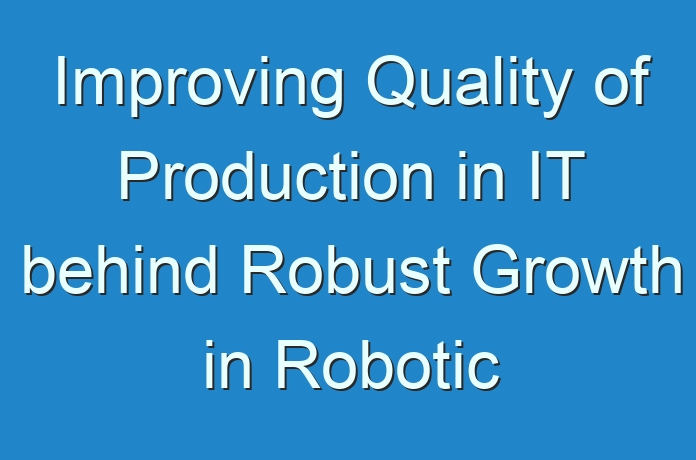
IT robotic process automation (RPA) tool and technologies have penetrated enterprise digital automation frameworks remarkably over the past few decades. The initial drive stemmed from the use of RPA to automate high-volume repeatable tasks, and financial service firms were one the firsts to jump on the bandwagon. Over the years, the IT robotic automation market has evolved steadily on the back of the dual value propositions: automating low-value tasks to free resources for high-value tasks, and at the same time relentless efforts by service providers to ease the implementation.
Want to know the obstructions to your company’s growth in future? Request a brochure @ https://www.transparencymarketresearch.com/sample/sample.php?flag=S&rep_id=4045
IT Robotic Automation Market Tools Making Inroads in High-Volume, Low-Value Business Processes
Consistent need to reduce staffing cost and the use of RPA for streamlining umpteen business processes have stridently created value for companies in other industries as well, such as manufacturing, retail, and healthcare. With time, more and more CIOs in companies of all sizes have spent dollars on adopting and deploying IT robotic automation. The drive for aligning RPA tools with business goals has been a compelling growth driver for year-over-year growth in the IT robotic automation market. It is, thus, no surprise when TMR analysts see vast possibilities: They estimate the global valuation of the IT robotic automation market to rise at growth rate of 28.1% compound annually from 2018 to 2026.
Small-scale Enterprises Offer Value-Grab Opportunities in Emerging Market of Asia Pacific
New applications of robotic process automation for businesses across all industries have emerged rapidly in developed countries. The drive for creating new customer experience propositions by leveraging RPA for end-use industries will spur the adoption rate in emerging economies as well. Worldwide, the rising use of RPA tools for a wide variety of tasks hinges on the impact bots can make on customer experiences. Evidently, a great deal of growth in the IT robotic automation market has come from wide adoption of technologies in call center operations, claims administration, help desks, and sales processes. Ability to harness the technologies without the need of a specialized workforce is one of the major aspects for the constant uptick in demand for RPA technologies in the IT robotic automation market.
On the global front, though North America has been the dominant regional market due to the vast scale of adoption, Asia Pacific has emerged as a key contender in recent years. A chunk of revenues from the regional market has come from the scope of automation in BPO sector in emerging economies. Another robust underpinning has come from the strides in e-commerce sales, where e-commerce companies are vigorously using RPA tools to attend to mundane customer requests. Not confined to using it for reactive role, market players view RPA as key growth avenue for carving out new customer experience in recent months, the reason having to do with the deluge of online sales amid Covid-19 restrictions.
Ease of Implementation Become Key Imperative to Unlock Steady Value
Despite the massive push for digitalization through RPA tools, the implementation remains a thorny issue for prospective customers. The conspicuous failure rate of RPA implementations worldwide has clouded the growth prospects of players in the IT robotic automation market. Perhaps, the more contentious and glaring concern has been the loss of jobs due to deployment of RPA, as issue in automation that has been often been fiercely debated. Without a comprehensive talent management strategy in place, the value propositions of IT robotic automation will be based on shaky ground. As a result, many stakeholders have geared up to address these concerns proactively and fast.
Purchase Premium Research Report @ https://www.transparencymarketresearch.com/checkout.php?rep_id=4045<ype=S
Proposition of Targeted Customer Value Drives Efforts: AI to Create New Proposition
Robotic process automation technology developers are veering off to new directions, anchored in the growing scope of intelligent enterprise automation. The ambit of the technology is notably expanding to entail decision-making capabilities with the help of AI tools and machine learning. Thus, IT robotic automation market is stridently slated for new potential of opportunities in the efforts of providers to equip modern RPA platforms with natural language processing (NLP) capabilities.
New entrants and incumbent players are equally fascinated by this proposition, given the trend of rising digital workforce across the globe. Manufacturing sector, especially, with a vision of digital transformation is likely to pave way to lodes of opportunities in near future. A case in point is the prospect of RPA in supply chain management.
Another interesting avenue is the rise in use of cloud services for RPA. The retail industry is one of the key contenders in the race. End-to-end automation through cloud-native RPA platforms unlocks a new avenue for market players and end-use businesses. The cloud-based platforms are expected to fuel the revenue generation from such platforms.
Companies who are vigorously making efforts to consolidate their stakes in the IT robotic automation market are UiPathSRL, Capgemini, Genpact Ltd., Cognizant Technology Solutions Corp., Infosys Limited, Tata Consultancy Services Limited., and Blue Prism.
Read Our Trending Press Release Below: https://www.prnewswire.com/news-releases/growing-trend-of-online-payments-to-invite-promising-growth-for-point-of-sale-pos-terminal-market-between-2020-and-2030-tmr-301179705.html





